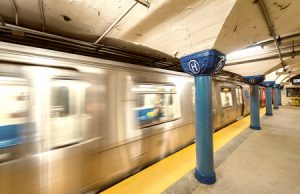New York’s MTA Orders Sleep Apnea Screenings After Deadly Crashes

A seldom-diagnosed health condition has been blamed for multiple deadly mass-transit crashes in recent years.
In 2014, a Metro-North train derailed in the Bronx, killing four people. In September of 2016, one person died when a commuter train crashed in Hoboken. The engineers in both of these accidents suffered from sleep apnea. Earlier this month, a Long Island Railroad Train crashed in Brooklyn; the engineer in this accident will test for sleep apnea as well.
This week, New York’s Metropolitan Transportation Authority (MTA) announced they will begin testing all train engineers and bus drivers for sleep apnea in hopes of preventing more tragedies like these.
What is Sleep Apnea, and Why is it Such a Problem?
Sleep apnea, also called obstructive sleep apnea or OSA, is a condition that causes the throat muscles to relax during sleep, blocking the windpipe. This causes breathing to stop and start repeatedly and prevents restful sleep. As a result, OSA sufferers face an increased risk of heart disease, heart attack, diabetes, high blood pressure, and stroke. They also tend to experience excessive drowsiness and may even fall asleep during the day. Researchers estimate that as many as 18 million Americans have OSA, but 80% go undiagnosed.
While many people still don’t think of sleep deprivation as a big deal, it is far more serious than we had previously known. To put things in perspective, AAA released a report stating that sleep deprivation can cause the same level of impairment as alcohol. And, losing just a few hours of sleep can more than double your risk of a crash. But perhaps the most important finding: you do not need to feel tired in order to be dangerously sleep-deprived. Even if you feel alert, if your brain and body have not had necessary rest, they will not function the way they’re supposed to.
Bus Drivers, Train Engineers, and Truck Drivers
While sleep is important for all people, it is especially vital for those at the wheel of large vehicles and locomotives. As truck accident lawyers, we have long been familiar with the devastating consequences of sleep deprivation among long-haul truckers. While drivers have a responsibility to get a proper amount of rest, testing for this sleep disorder could help protect the safety of transportation workers and passengers alike.
As of November 2016, New Jersey transit no longer allows engineers exhibiting signs of sleep apnea to operate trains, pending diagnosis and treatment.
Metro-North screened 500 engineers and trainees and found that about 10% had sleep apnea.
The MTA has now expanded their screenings to include all train and bus lines.
Fortunately, doctors and sleep specialists offer patients many tools for treating sleep apnea. Simple lifestyle changes can make a big difference. Getting screened and seeking treatment can prevent disease and lengthen your life. But, it can make our commutes and communities safer too.

Marion Munley
Marion Munley is recognized for her compassionate representation of catastrophically injured clients and her steadfast dedication to them and their families. Her advocacy has produced numerous multimillion-dollar recoveries, including one of the largest trucking accident settlements on record. Marion is Triple Board Certified by the National Board of Trial Advocacy in Civil Trial, Civil Practice, and Truck Law, and since 2023 has been named one of Pennsylvania’s Top 10 Super Lawyers by Super Lawyers.
Posted in Personal Injury.









